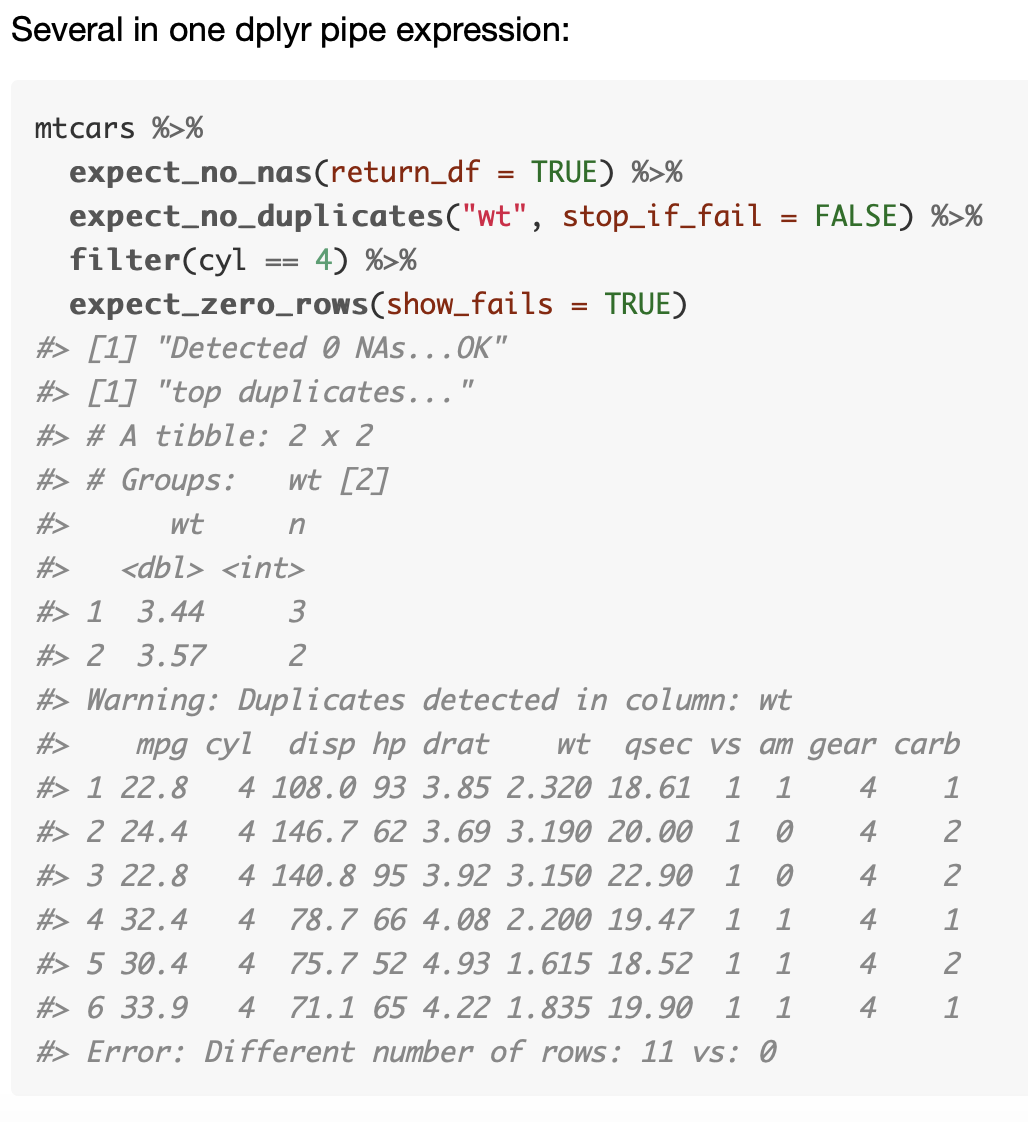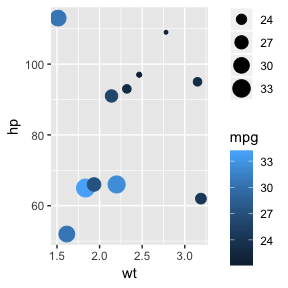Avoiding embarrassment by testing data assumptions with expectdata
Expectdata is an R package that makes it easy to test assumptions about a data frame before conducting analyses. Below is a concise tour of some of the data assumptions expectdata can test for you. For example,

Note: assertr is an ropensci project that aims to have similar functionality. Pros and cons haven’t been evaluated yet, but ropensci is a big pro for assertR.
Check for unexpected duplication
library(expectdata)
expect_no_duplicates(mtcars, "cyl")
#> [1] "top duplicates..."
#> # A tibble: 3 x 2
#> # Groups: cyl [3]
#> cyl n
#> <dbl> <int>
#> 1 8 14
#> 2 4 11
#> 3 6 7
#> Error: Duplicates detected in column: cyl
The default return_df == TRUE option allows for using these function as part of a dplyr piped expression that is stopped when data assumptions are not kept.
library(dplyr, warn.conflicts = FALSE)
library(ggplot2)
mtcars %>%
filter(cyl == 4) %>%
expect_no_duplicates("wt", return_df = TRUE) %>%
ggplot(aes(x = wt, y = hp, color = mpg, size = mpg)) +
geom_point()
#> [1] "no wt duplicates...OK"

If there are no expectations violated, an “OK” message is printed.
After joining two data sets you may want to verify that no unintended duplication occurred. Expectdata allows comparing pre- and post- processing to ensure they have the same number of rows before continuing.
expect_same_number_of_rows(mtcars, mtcars, return_df = FALSE)
#> [1] "Same number of rows...OK"
expect_same_number_of_rows(mtcars, iris, show_fails = FALSE, stop_if_fail = FALSE, return_df = FALSE)
#> Warning: Different number of rows: 32 vs: 150
# can also compare to no df2 to check is zero rows
expect_same_number_of_rows(mtcars, show_fails = FALSE, stop_if_fail = FALSE, return_df = FALSE)
#> Warning: Different number of rows: 32 vs: 0
Can see how the stop_if_fail = FALSE option will turn failed expectations into warnings instead of errors.
Check for existance of problematic rows
Comparing a data frame to an empty, zero-length data frame can also be done more explicitly. If the expectations fail, cases can be shown to begin the next step of exploring why these showed up.
expect_zero_rows(mtcars[mtcars$cyl == 0, ], return_df = TRUE)
#> [1] "No rows found as expected...OK"
#> [1] mpg cyl disp hp drat wt qsec vs am gear carb
#> <0 rows> (or 0-length row.names)
expect_zero_rows(mtcars$cyl[mtcars$cyl == 0])
#> [1] "No rows found as expected...OK"
#> numeric(0)
expect_zero_rows(mtcars, show_fails = TRUE)
#> mpg cyl disp hp drat wt qsec vs am gear carb
#> Mazda RX4 21.0 6 160 110 3.90 2.620 16.46 0 1 4 4
#> Mazda RX4 Wag 21.0 6 160 110 3.90 2.875 17.02 0 1 4 4
#> Datsun 710 22.8 4 108 93 3.85 2.320 18.61 1 1 4 1
#> Hornet 4 Drive 21.4 6 258 110 3.08 3.215 19.44 1 0 3 1
#> Hornet Sportabout 18.7 8 360 175 3.15 3.440 17.02 0 0 3 2
#> Valiant 18.1 6 225 105 2.76 3.460 20.22 1 0 3 1
#> Error: Different number of rows: 32 vs: 0
This works well at the end of a pipeline that starts with a data frame, runs some logic to filter to cases that should not exist, then runs expect_zero_rows() to check no cases exist.
# verify no cars have zero cylindars
mtcars %>%
filter(cyl == 0) %>%
expect_zero_rows(return_df = FALSE)
#> [1] "No rows found as expected...OK"
Can also check for NAs in a vector, specific columns of a data frame, or a whole data frame.
expect_no_nas(mtcars, "cyl", return_df = FALSE)
#> [1] "Detected 0 NAs...OK"
expect_no_nas(mtcars, return_df = FALSE)
#> [1] "Detected 0 NAs...OK"
expect_no_nas(c(0, 3, 4, 5))
#> [1] "Detected 0 NAs...OK"
#> [1] 0 3 4 5
expect_no_nas(c(0, 3, NA, 5))
#> Error: Detected 1 NAs
Several in one dplyr pipe expression:
mtcars %>%
expect_no_nas(return_df = TRUE) %>%
expect_no_duplicates("wt", stop_if_fail = FALSE) %>%
filter(cyl == 4) %>%
expect_zero_rows(show_fails = TRUE)
#> [1] "Detected 0 NAs...OK"
#> [1] "top duplicates..."
#> # A tibble: 2 x 2
#> # Groups: wt [2]
#> wt n
#> <dbl> <int>
#> 1 3.44 3
#> 2 3.57 2
#> Warning: Duplicates detected in column: wt
#> mpg cyl disp hp drat wt qsec vs am gear carb
#> 1 22.8 4 108.0 93 3.85 2.320 18.61 1 1 4 1
#> 2 24.4 4 146.7 62 3.69 3.190 20.00 1 0 4 2
#> 3 22.8 4 140.8 95 3.92 3.150 22.90 1 0 4 2
#> 4 32.4 4 78.7 66 4.08 2.200 19.47 1 1 4 1
#> 5 30.4 4 75.7 52 4.93 1.615 18.52 1 1 4 2
#> 6 33.9 4 71.1 65 4.22 1.835 19.90 1 1 4 1
#> Error: Different number of rows: 11 vs: 0